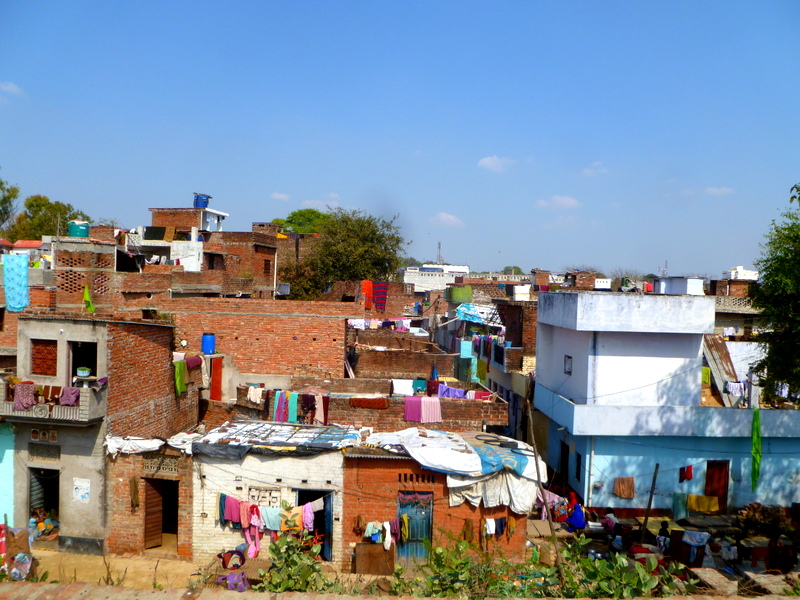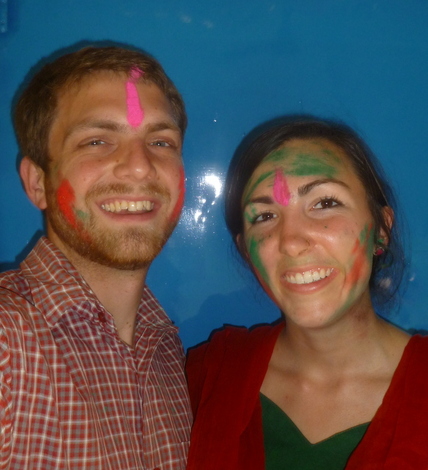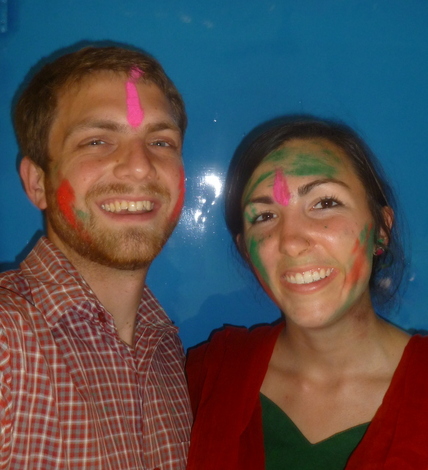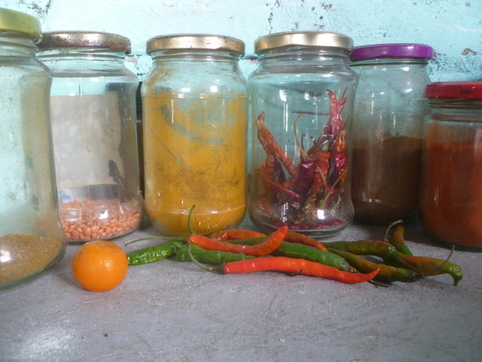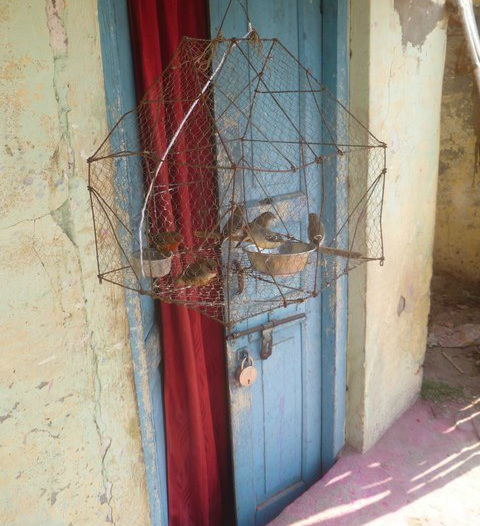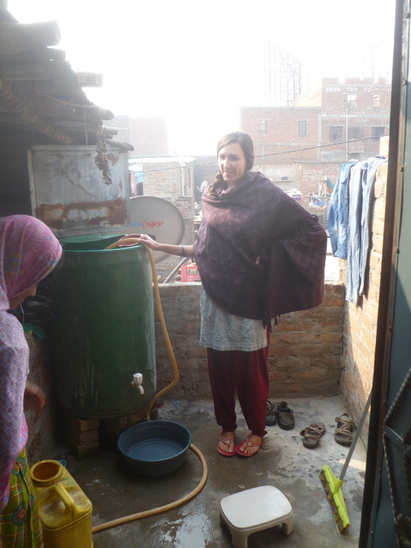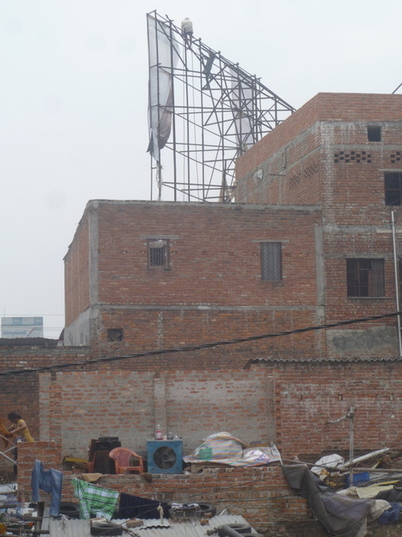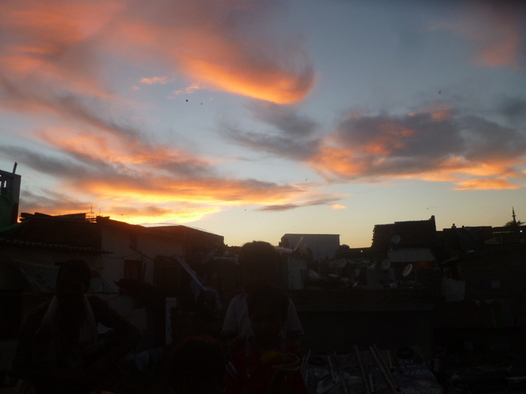“Call the child,” they said. They meant the youngest daughter, the sponsored child. The sponsored child raced across the room from where she had been standing with us behind the curtain and one of her older sisters began frantically trying to comb down her hair, put in a clip, make her presentable. My friend called the child’s name again, sounding irritated. It wasn’t that the visitors were showing any signs of being demanding or impatient; I couldn’t see their faces from where I was standing, but they might have even been smiling. It was just that my friend knew where she stood with them: they were the patrons, and their expectations must be met.
My friend called her daughter again. The older sister gave up trying to put in the hair clip and the little girl came running to the backdoor to stand next to her mother. I wondered if this group of four recognizes the effect their presence has on people. One of the Sirs took out his camera to take a photo of the two of them standing there, in front of the shop that World Vision had donated the initial stock for. “To provide this family with a much-needed livelihood,” I’m sure the letter will say when the photo arrives at the sponsor’s house in Australia.
“Smile!” the man said. Click.
A moment later they were gone. My friend returned and sat down wearily. “We were just talking about this,” I said. “You’re hardly making any profit from this store. You still don’t have enough money for food or medicine. Why didn’t you tell them that?”
“Unse kyaa matlab hai? What do they care?” she said. Just then, a customer arrived. She pulled out the box where chewing tobacco was hidden away and handed a couple of packets to the man at her door. Understandably, World Vision has forbidden her from selling those addictive products in her store. Unfortunately, they’re just about the only thing in stock that she makes any money on. The other colored packages of cookies and candy and salty snacks have negligible profit margins. “The things they gave me don’t sell,” she said. “They should have just given me money and I would have bought things for the store myself.” Fair enough. But I find myself wondering whether even that modification would have made much difference. There are so many of these little doorway shops in our neighborhood that there’s hardly enough demand to warrant the supply. The fact that most people aren’t able to read or write and have no knowledge of accounting doesn’t increase the chances of entrepreneurial success, either.
I think again of the photo. That photo makes me angry, because that photo will be a lie. The family in the picture is still constantly worried about how to stay afloat financially, and they go into debt over basic healthcare and school fees. When I had a sponsored child on my fridge in college, I certainly assumed the smiling face looking back at me was out of the woods, so to speak, now that a big aid organization had intervened (that was a Compassion child, by the way, but a few years back in Thailand I also discovered sponsored children being withdrawn from the program and sent to the local temple to live as monks because their families still weren’t able to feed them). I understand the marketing of the whole thing, and how you raise more money by turning compassion into a canned feel-good experience that can be personalized to appeal to consumers. Just $30 a month, to change somebody’s life, supposedly. Heck, it’s a good deal.
But those kinds of bargains just don’t exist in the real world. And I would love to turn this little anecdote into a plug for building relationship with the poor instead of just throwing money at them—I do believe that money is the least of my neighbors’ problems, when you get right down to it—but this situation does not demonstrate any such neat and tidy moral. The fact is that I’ve known this family for about two years, and despite the fun times we’ve had together and the stories we’ve shared and the deep sense of connection we have with each other, all that relationship hasn’t had a measurable impact on their finances. At all. The stresses in their lives are essentially the same now as they were when we first met them. But for what it’s worth, they do tell me honestly about those problems. My friend has cried and laughed and even gotten angry and argued with me, which she would never do with a patron, a boss, a donor, or anyone she needed to impress or appease in order to keep the relationship in tact.
So perhaps I’m being too hard on the international aid groups, because I don’t have a cunning alternative to offer them. But as long as we’re going around not changing the world (because that is beyond us), we might as well get to know our neighbors and try to love them well. Change is slow and small, usually, and it doesn’t always come… but when it does, it nearly always comes through relationship.
